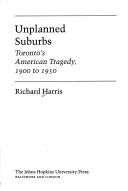Creating the North American Landscape
1 total work
This work looks at the social history of Toronto, showing that its pre-1939 suburbs were socially and ethnically diverse, with a large number of lower-income North American families making their homes on the urban fringe. It looks at the decentralization of blue-collar employment as a reason for working-class families leaving the city. Although there were advantages - a home of one's own, a garden, access to the countryside - the unplanned suburban developments led to increases in the costs of needed services. The author shows that, even by the 1920s, many families had fallen into arrears and lost their homes as a result of rising property taxes - a trend that deepened with the onset of the Great Depression. The text concludes that even a minimal amount of planning might have helped retain the advantages of owner-built housing while reducing public costs.
